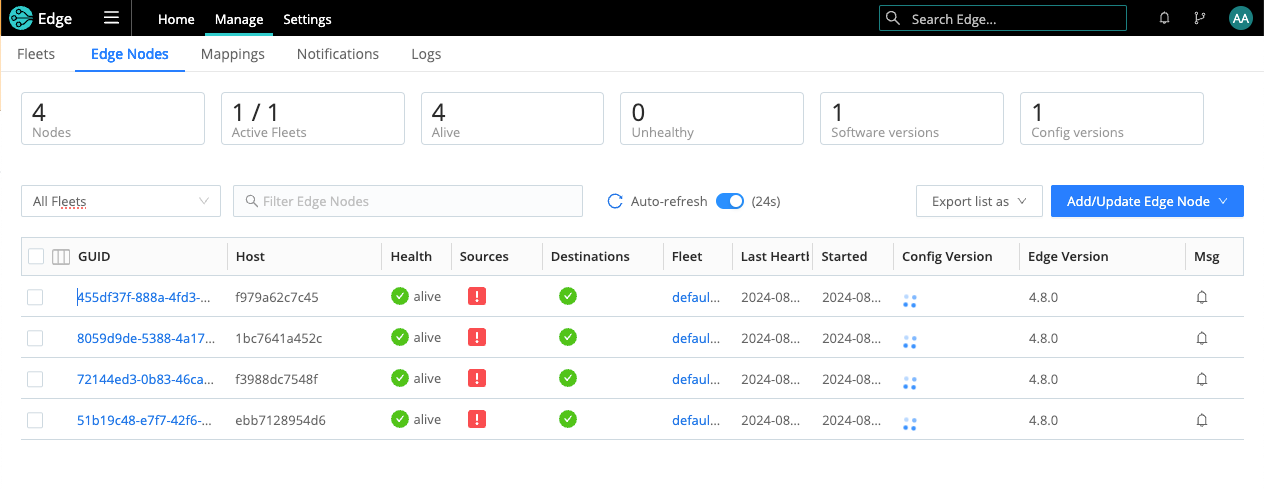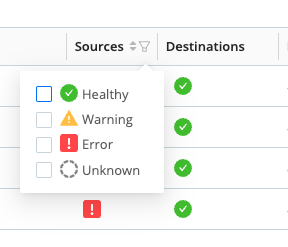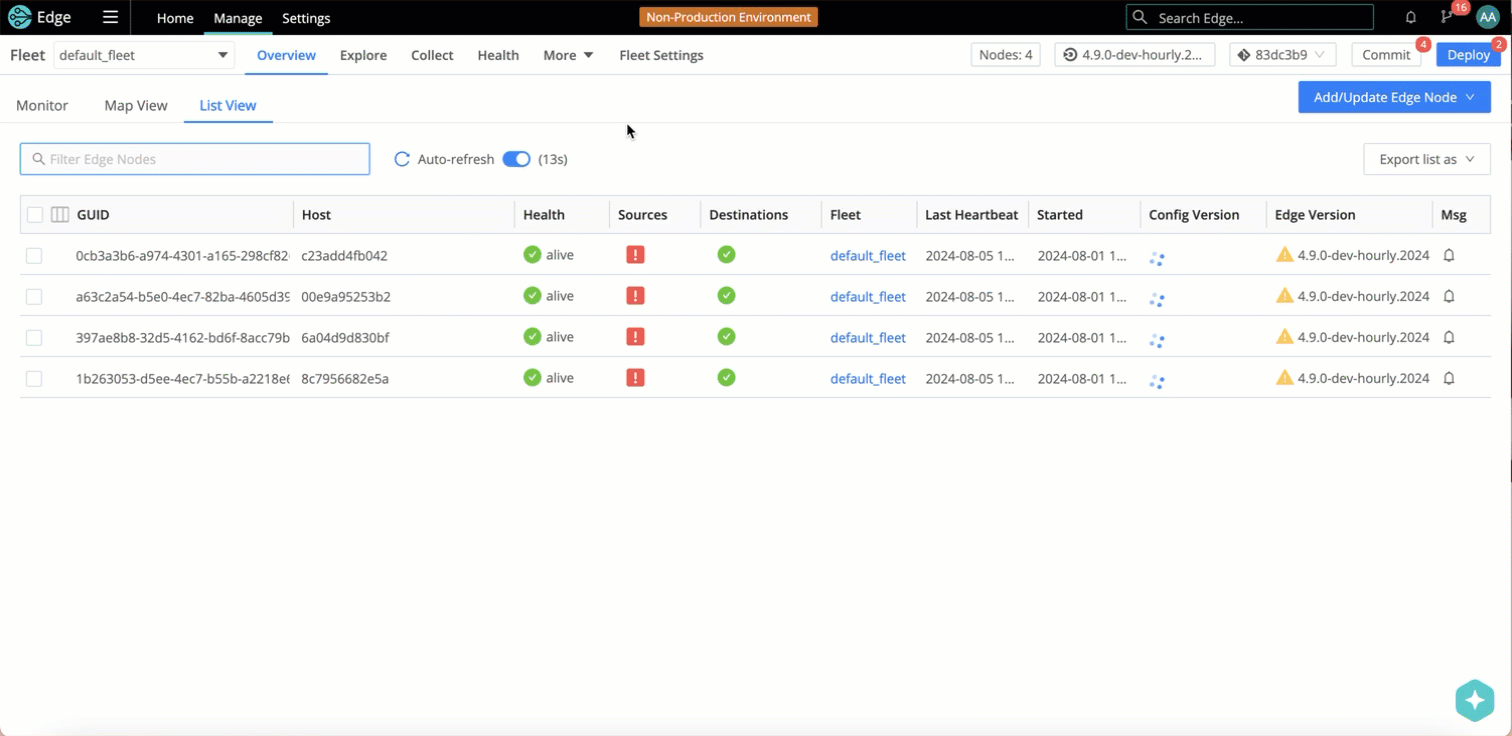Cribl Edge 4.8
| PRODUCT | DATE | RELEASE | ADDITIONAL RESOURCES |
|---|---|---|---|
| Edge | 2024-08-14 | Feature | Known Issues, Cribl Stream 4.8 Release Notes |
4.8 is looking great! We’ve tinkered with Cribl Edge to bring you a whole host of improvements. This release showcases performance enhancements to Windows Event Logs Source, improved visibility into Source and Destination health status at a Node level, a streamlined Global Settings experience in Cribl.Cloud, and so much more.
New Features
These features are new to Cribl Edge:
Improved Source and Destinations Health Status Visibility at a Node Level
To help you monitor and troubleshoot Edge Nodes, you can use view the health status for Sources and Destinations associated with a specific Node.

To quickly identify Nodes that have issues, you can filter and sort the Source and Destination columns in the Node list.

In addition, you can investigate the activity of Sources, Destinations, Pipelines, Routes, and Packs for an individual Node by looking at the Data Activity Tab of the Node Information drawer - you don’t need to Teleport into the Node.

Enhanced Windows Event Logs Source
We enhanced the Windows Event Logs Source to interact directly with the Windows Operating System to collect logs without relying on Windows Tools like PowerShell or wevtutil. This newly enhanced Source now supports rendering for XML events.
To enable this performant module, navigate to the Windows Event Log Source configuration. Then, select Advanced Settings and toggle Use Windows Tools off (default). Save the Source.
Here are some of the changes we made to events:
JSON
- The Keywords value is now a string instead of the number that didn’t work correctly.
- Fields that had null values are no longer included.
XML
- Rendered event messages contain the
<RenderingInfo>...</RenderingInfo>tag on_rawevents.
Experience Improvements
We introduced the following changes to Cribl Edge to improve your experience:
Synergy Between the Target Version and Upgrade Status Functionality
We’ve updated the icon on the Target Software Version control and updated the window that will open when you select it. Now, select one button to change both the target software version for a Fleet and view the status of upgrades in progress.

Include Windows MSI Logs in Error Diagnosis
If Windows MSI logs are available, you can choose to include them in the diag bundle.
Fleet-level Certificate Management
You can now configure and manage certificates at the Fleet level. Subfleets automatically inherit these certificates and propagate them to Edge Nodes, simplifying deployment. View and manage certificates in Fleet Settings.
Improved Global Settings
Now when you opt in to the new Cribl.Cloud user interface, you’ll get an improved Global Settings experience, in addition to the streamlined global navigation experience and access to Workspaces, delivered in previous releases.
New Scale Reads Redis Function
The Redis function has a new setting, Scale Reads, that allows you to specify which nodes in a Redis cluster should handle read commands. You can choose to direct reads to primary nodes, replica nodes, or both. This setting helps balance load and optimize read performance while providing flexibility between strong consistency and improved scalability.
Storage Card Display
To improve disk usage accuracy, the Storage card now displays total storage rounded to two decimal places on the Landing and Monitoring pages. The result is a more precise view of your disk space, which allows you to plan your capacity and use it more effectively.
Run Cribl Image as Non-Root in Docker
To run the Cribl image as a non-root user, use Docker’s --user option or the
Docker Compose user setting. For correct operation, set the CRIBL_VOLUME_DIR
environment variable to a writable location. Using a persistent volume mounted
to CRIBL_VOLUME_DIR is highly recommended for performance and data integrity.
Adjust the Data Routes Table Width
In the Data Routes table, you can now adjust the column width by dragging and dropping column dividers.
Assign a Mapping ID to Teams
You can now assign a Mapping ID to Teams in Cribl.Cloud, allowing you to map IDP groups to Teams.
Sources and Destinations
We made improvements to these Sources and Destinations:
ServiceNow Cloud Observability Destination
✨ New ✨
We’ve added the ServiceNow Cloud Observability Destination. This allows you to
seamlessly route logs, metrics, and traces to the ServiceNow Cloud Observability
platform using the OpenTelemetry Protocol (OTLP). You can configure the
Destination with either HTTP or gRPC protocols, and securely manage your access
tokens using Cribl’s text secret storage.
Azure Sentinel Destination is Now Microsoft Sentinel
To align with Microsoft, we’ve updated the name of the Azure Sentinel Destination to Microsoft Sentinel. We’ve also added a new setting, Scope, that allows you to configure the integration across various Azure environments, including Azure Public Cloud, Azure US Government Cloud, and Microsoft Azure operated by 21Vianet.
HTTP Raw and Bulk API: Enhanced Auth Token Metadata Handling
We’ve introduced enhanced metadata handling for Auth tokens in both HTTP Raw and HTTP (Bulk API) Sources. This provides greater flexibility and control over event processing, enabling you to add context to events based on the token used, and enhancing security by avoiding direct use of authorization values in Routes and Pipelines.
More Supported Metric Types for OTel
The OpenTelemetry (OTel) Source and Destination now support OTLP Metrics sum, summary, and histogram metric types. This ensures that all relevant metrics are accurately represented and transmitted, including support within the OTLP Metrics Function.
Default Certificate Verification for HTTPS
We’ve strengthened security by enabling default certificate verification for HTTPS connections. Several newly created Sources and Destinations now automatically reject expired, self-signed, or mismatched certificates. This change aligns with industry best practices for TLS verification and provides a more secure and reliable data processing experience.
Exclusive Support for Signature Version 4 Authentication
The Amazon CloudWatch Logs Destination now exclusively supports Signature Version 4 authentication.
Corrections
We made the following fixes in this release:
Security Fixes
| ID | Description |
|---|---|
CRIBL-25761 | @azure/msal-node has been updated to version 2.9.2 to include the latest security updates. |
| CRIBL-25764 | mssql2 has been updated to version 10.0.3 to include the latest security updates. |
| CRIBL-25758 | @google-cloud/pubsub has been updated to version 4.5.0 to include the latest security updates. |
| CRIBL-25756 | @grpc/grpc-js has been updated to version 1.9.15 to include the latest security updates. |
Source and Destination Fixes
| ID | Description |
|---|---|
CRIBL-26107 | Splunk TCP Sources previously defaulted to the older S2S protocol version 3. This behavior affected new instances and Worker Groups/Fleets. Newly created Splunk TCP Sources within existing Worker Groups/Fleets, however, correctly defaulted to version 4. This issue has been resolved, and all newly created Splunk TCP Sources now default to the correct S2S protocol version 4. |
| CRIBL-25842 | Splunk Destinations experienced issues when sending data via Splunk-to-Splunk (S2S) protocol to Splunk. The connection was terminated before any data was sent, only when acknowledgments (ACKs) were enabled. |
| CRIBL-25972 | The SNMP Trap Source allowed MD5 authentication in FIPS mode. As MD5 doesn’t meet FIPS security requirements, it caused data flow problems and error logs. |
| CRIBL-26377 | The _raw field now expands fully to reveal its entire nested JSON structure when tapped, as expected. |
Other Functional Fixes
| ID | Description |
|---|---|
| CRIBL-25523 | Kubernetes logs no longer show unnecessary repeated log entries for errors and warnings. |
CRIBL-26719 | The C.Time.s3TimePartition() and C.Time.timePartition() Functions no longer cause Worker Processes to crash when encountering events with timestamps prior to the Unix epoch. |
| CRIBL-26478 | The system no longer fails to properly release files from disk when you enable Source-side PQ. |





